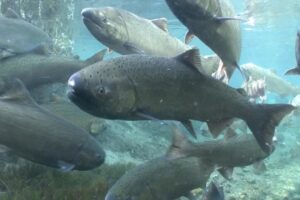
A commercial salmon troll fishery in Southeast Alaska that contributes millions of dollars to the regional economy is uncertain, with federal fisheries managers and harvesters pitted against an environmental group that contends endangered orca whales need those fish more.
The state of Alaska on May 3 served notice of its intent to appeal a two-page ruling by U.S. District Court Judge Richard A. Jones to close the salmon troll fishery to provide more food for endangered Southern Resident killer whales in Puget Sound.
A day earlier, the judge ruled in favor of the plaintiff, the Washington State-based Wild Fish Conservancy, in its three-year-old battle to secure more Chinook salmon for the Southern Resident killer whales in Puget Sound.
Emma Helverson, executive director of the Wild Fish Conservancy, praised the judge’s decision, calling it “the largest victory for Southern Resident killer whale recover in decades.” Helverson contends that halting the commercial fishery in Southeast Alaska will allow more wild Chinook to return to spawning grounds in Washington state and help restore wild Chinook in rivers throughout Oregon, Washington and British Columbia.
The lawsuit stems from a biological opinion released by National Marine Fisheries Service in 2019 in which NMFS said that the commercial salmon troll fishery would have no significant impact on fish available for Southern Resident orcas.
The Wild Fish Conservancy argued that NMFS violated sections of the Endangered Species Act and the National Environmental Policy Act by failure to fully account for the impact of the troll fishery on Chinook salmon for the threatened population of orcas in Puget Sound.
Alaska Fish and Game Commissioner Doug Vincent-Lang was quoted as saying that the state of Alaska would “vigorously defend our fisheries from this unjustified ruling.”
“We have a responsibility to look out for our fisheries and the Southeast coastal communities and families that rely on them,” he said.
“We understand the critical importance of this fishery to the affected fishermen and communities across Southeast,” Alaska Attorney General Treg Taylor added. “We will be filling a request to stay the order pending appeal and immediately notifying the Ninth Circuit that an appeal is forthcoming.”
Tim Bristol, executive director of the environmental nonprofit SalmonState, noted in a statement that Southeast Alaska Trollers have reduced their Chinook harvest over the years with no effect on killer whales or Washington salmon populations, because, he said, as Washington’s State of Salmon in Watersheds report makes clear, it is habitat destruction, dams, climate change and contamination that are the driving problems feeding their continued decline.
“The science and data clearly shows that habitat loss, dams, climate change, water pollution, and urbanization are harming salmon and orcas in the Northwest – not our hook-and-line fishery that operates almost 1000 miles away and has done so sustainably for over 100 years,” Linda Behnken, director of the Alaska Longline Fishermen’s Association, said.
